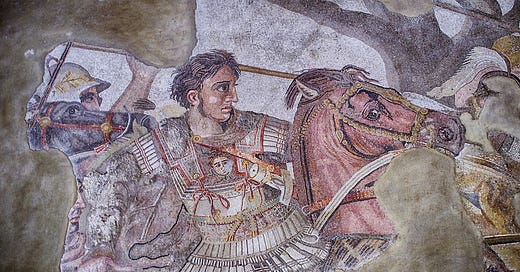Weekly Hit of History: The Beginning of Alexander the Great’s Conquest
The Battle of the Granicus showcases many traits he'd later demonstrate during his conquest
What happened?
More than 2,300 years ago from the end of this May (the exact date is unclear), Alexander the Great’s defeat of a Persian army at the Granicus River in modern-day Turkey marked an explosive beginning to his conquest of the Persian Empire.
Alexander’s invasion faced its first major challenge at this river: a Persian army waited for him on the opposite bank, led by local satraps, the Persian provincial governors. The Persians had employed the Greek mercenary Memnon of Rhodes, who, knowing the Macedonian army’s might, urged the Persians to adopt a scorched-earth policy. Better for them to burn their local farms and supplies than risk open battle with Alexander. As they retreated deeper into Asia Minor, Alexander’s army would dwindle from starvation and disease.
A fragment of a mosaic from the House of Faun, Pompeii shows Alexander in battle. National Archeological Museum of Naples. Photo by Andrey Korchagin/Flickr.
The Persians refused Memnon’s advice and sought open battle.
After drawing up to the river, one of Alexander’s top generals advised him to wait to commence battle until the next day, to give the soldiers time to organize. Alexander disagreed, responding, according to the ancient historian Arrian:
I would be ashamed, after having easily crossed the Hellespont [the main body of water separating Europe from Asia Minor], if this little stream keeps us from crossing as we are. I would consider it unworthy of the Macedonians’ renown and of my quickness to accept risks.
His mind made up, Alexander led parts of his right wing—a combination of cavalry and foot skirmishers—into the river. The river was fordable, but the banks were, as the historian Plutarch relates, “extremely muddy and slippery,” and a storm of Persian javelins met the Macedonians. Nonetheless, Alexander and his troops gained the other bank and threw themselves upon their enemy.
This was not a Hollywood-style, charge of the Rohirrim, romantic cavalry clash, but a brutal, claustrophobic meat grinder. Arrian says that
Though the battle was fought on horseback, it looked more like an infantry engagement: in a confined space horses contended with horses, men with men, the Macedonians trying to drive the Persians from the bank and force them into the plain, the Persians trying to deny the Macedonians a beachhead and thrust them back to the river.
In the midst, Alexander fought so desperately that his spear shattered and he was forced to take a spare from one of his companions. At one point, Arrian tells us that a Persian nobleman was ready to deliver a death blow to Alexander’s back, likely killing him, but his companion, Cleitus, “struck [the Persian] on the shoulder, cutting his arm off with the scimitar still in its grasp.”
A statue of Alexander the Great in Skopje, Macedonia. Harold Litwiler/Flickr.
The Persians eventually panicked and fled. The only remaining troops were thousands of Greek mercenaries who made up a part of the Persian army. The Greeks attempted to surrender after finding themselves abandoned, but Plutarch says that Alexander, “guided rather by passion than judgment,” massacred most of them.
Alexander had won his first major battle in the war against Persia. The enemy army was in retreat, and the road now lay open to the Persian Empire’s riches.
Why should you care?
The Battle of the Granicus showcases many traits that Alexander later demonstrated during his conquest. This was not the first time he would ignore his generals’ advice—and be proven right. He made it a habit to ride straight into battle, shoulder-to-shoulder with his companions, risking his life and gaining scars and a warrior’s reputation. In future battles, he again relied heavily on his Companion Cavalry as the hammer blow that tipped the balance in his favor.
Granicus also showcased the Macedonian king’s brutality. He would sometimes later show mercy to his enemies, but his slaughter of the surrendering Greek mercenaries showed that Alexander was capable of murdering thousands. Many cities were razed and many innocents died before he completed his conquest.
Alexander’s conquest also began the Hellenistic Age, spreading Greek ideas, language, art, and architecture throughout the vast territories he conquered, which often fused with local cultures in fascinating ways. For example, Greek influence in conquered territories corresponding to modern-day Afghanistan and Pakistan resulted in Greco-Buddhism, a mix of Greek culture and Buddhism, which ultimately explains why statues of Buddha portray him wearing Greek robes.
Hellenistic culture also created and built priceless works of art including the Winged Victory sculpture and the Venus de Milo; science and engineering marvels like the now-lost Lighthouse of Alexandria; and many cities bearing Alexander’s name, the most famous—Alexandria in Egypt—becoming a beacon of science, culture, and religion for centuries. Hellenism also led to the spread of the Greek language, which is why the New Testament was written in Greek—to be readable by the people of the eastern Mediterranean world.
A statue of Alexander the Great along the shore in Thessaloniki, Greece. Herbert Frank/Flickr.
But Alexander’s fame is perhaps the most direct proof for his effect on world history. He was undefeated on the battlefield, his battles are still analyzed in military academies, and he inspired other famous military geniuses from Caesar to Napoleon, but you don’t have to be a military historian to know basic facts about his life and achievements. Arrian closes his history saying, “I suppose there was no race of men, no city at that time, no single person whom Alexander’s name did not reach.” Those words were written roughly 2,000 years ago, and they still ring true.







